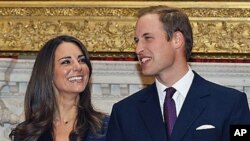As Britain prepares for the royal wedding in April 2011 of Prince William and his longtime girlfriend Kate Middleton, media attention on the royal couple is increasing, as is the focus on the role of monarchies in the modern era.
There are new Royal mugs, and much speculation about what the bride will wear. Their spring wedding is expected to attract a million extra visitors to Britain.
The pomp and ceremony of Britain's royals, headed by Queen Elizabeth II, is a big tourist draw - estimated to be worth about $800 million to the British economy.
History, tradition rule
Patricia Yates, with Britain's tourist agency, said, "It's really a bedrock of why people come to Britain - it's a sense of history and tradition with a modern twist on it."
Opponents of the British Monarchy, however, say people would come to see Buckingham Palace, the Queen's London home, Windsor Castle and the other royal attractions without the royal family. They want Parliament to abolish the monarchy, and they don't like the fact that the government's authority comes from the Queen, although she has a largely ceremonial role. The Queen meets with the prime minister weekly, but is not seen to be interfering in politics.
Graham Smith is with the anti-monarchy group Republic. He said, "The monarchy is an integral part of our Constitution and our political process. The Queen's our head of state, and as far as we're concerned, that's completely wrong."
Global monarchies
There have been some calls here for the succession to skip a generation, for Prince Charles to step aside in favor of his more popular son, but that seems unlikely.
Queen Elizabeth also is the head of state of fifteen other countries, and the British Royal Family is not the only one in the world - there are monarchies across the globe.
King Abdullah of Saudi Arabia heads one of the few royal families that actually rules. There is still a Zulu king, although his kingdom is now part of South Africa. Around the world royal families have very different rituals and very different roles.
Different types of monarchies
Royal commentator, Richard Fitzwilliams, said, "In Europe, most monarchies are constitutional monarchies wielding little executive power. In the Middle East, the vast majority are autocratic, in the Far East there is a mixture between the more democratic and those, such as Japan and Thailand, where the monarchy is regarded as a form of sacred being."
Thailand's King, Bhumibol Adulyadej, is the world's longest reigning head of state. He has been on the throne since 1946. This celebration of his 60th anniversary as monarch attracted royals from all over the world. He is credited with helping Thailand transition to a democracy, and is seen as a symbol of stability in a nation wracked by political crises. Now elderly and in poor health, the royal succession concerns his subjects, as he is the only king most Thais have ever known.
Here in Britain, millions are expected to be watching as the royal family gets it's newest member and future queen.




